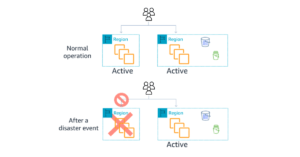Published Date :
Introduction
A leading real estate company operating across multiple regions faced challenges in ensuring business continuity and data protection. Their legacy infrastructure lacked robust disaster recovery capabilities and efficient backup solutions, posing a significant risk to their operations and customer data.
Challenges:
⦿ Disaster recovery capabilities: The company relied on manual backups and off-site storage, making data recovery slow and cumbersome in case of disaster.
⦿ Data security concerns: The lack of centralized data management and encryption exposed sensitive customer information to potential breaches.
⦿ Inefficient backup processes: Manual backups were time-consuming and prone to human error, leading to potential data inconsistencies and loss.
⦿Limited scalability: The existing infrastructure couldn’t accommodate the company’s growing data needs and expanding operations.

Solution: The real estate company partnered with AWS to implement a comprehensive disaster recovery and backup solution using the following services:
AWS Backup: Automated backup of critical data across various AWS services like Amazon Elastic Compute Cloud (EC2) instances, Amazon Relational Database Service (RDS), and Amazon S3 buckets.
Amazon S3 Glacier: Long-term, cost-effective storage for archive data with high durability and retrieval flexibility.
AWS CloudFormation: Automated infrastructure provisioning and deployment for rapid recovery in case of disaster.
AWS CloudEndure Disaster Recovery: Replicated on-premises workloads to the AWS cloud for fast and reliable recovery.
AWS Lambda: Serverless functions triggered by backup events for automated data validation and notification.
Results:
Improved data protection: AWS Backup provided centralized data management and encryption, ensuring the security and integrity of sensitive customer information.
Enhanced disaster recovery: CloudEndure Disaster Recovery facilitated rapid and reliable recovery of critical workloads in case of disaster, minimizing business downtime.
Automated backups: AWS Backup eliminated manual backups, saving time and reducing the risk of human error.
Scalable infrastructure: The AWS cloud offered a scalable and flexible platform to accommodate the company’s growing data needs and future expansion.
Reduced costs: The pay-as-you-go model of AWS services optimized costs and eliminated the need for upfront investments in hardware and software.
Key benefits of AWS:
Increased business continuity: Reduced downtime from potential disasters ensured seamless business operations and minimized revenue loss.
Improved data security: Enhanced data protection ensured compliance with industry regulations and protected sensitive customer information. Reduced operational costs: Automated backups and cloud-based infrastructure eliminated manual processes and minimized hardware maintenance expenses.
Enhanced agility: Scalable and flexible infrastructure provided the capability to adapt quickly to changing business demands.
Conclusion:
⦿ By leveraging AWS disaster recovery and backup solutions, the real estate company achieved significant improvements in data protection, business continuity, and operational efficiency.
⦿ Disaster events pose a threat to your workload availability, but by using AWS Cloud services you can mitigate or remove these threats. By first understanding business requirements for your workload, you can choose an appropriate DR strategy. Then, using AWS services, you can design an architecture that achieves the recovery time and recovery point objectives your business needs.
⦿ This case study demonstrates the effectiveness of AWS solutions in providing comprehensive disaster recovery and backup for businesses of all sizes and across diverse industries.
Need help with your cloud?
"No worries! Our experts are here to help you. Just fill the form and we'll get back to you shortly!"
Our Partners


 +919356301699
+919356301699 hello@anetautomation.com
hello@anetautomation.com
